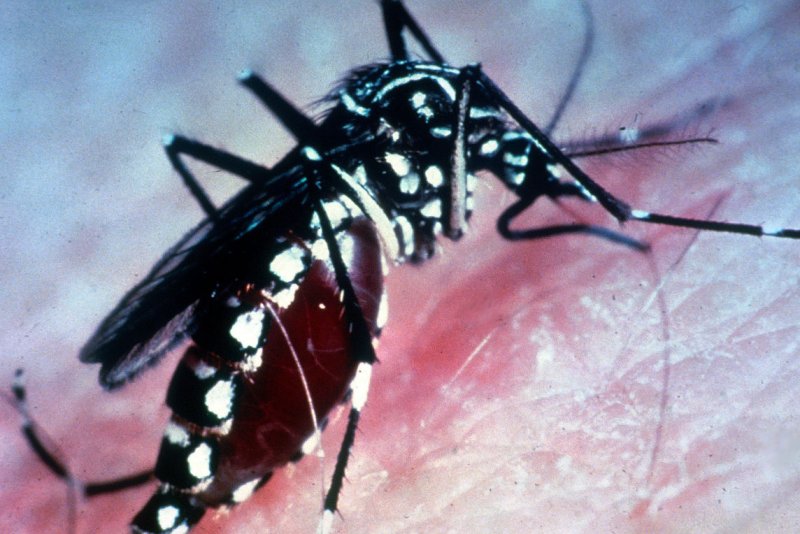With cases of chikungunya continuing to increase, researchers are advising travelers to affected countries be more vigilant at trying to prevent mosquito bites. File Photo by Jack Leonard/New Orleans Mosquito Control Board |
License Photo
WASHINGTON, Nov. 30 (UPI) -- Encephalitis in patients infected with the chikungunya virus is far more common than previously thought, according to a new study of an outbreak.
The outbreak on Reunion Island, located in the Indian Ocean, lasted from 2005 to 2006, and affected about 300,000 people. Researchers said they mounted the study to find out if people who suffered neurological problems when they contracted the virus were still afflicted three years later.
Chikungunya, which originated in Africa, was first seen in the Western Hemisphere in the Caribbean island of St. Martin. It has since spread to other islands in the region, as well as Central and South America, and been seen as far north as Florida, Georgia and North Carolina.
The virus is spread by mosquitoes, causing fever, joint pain, headache, muscle pain, joint swelling and rash. Most people recover from the painful illness, but joint pain may become chronic. Infants and the elderly already were thought to be at higher risk of death from the virus, even before the higher rates of potentially deadly brain inflammation were found by researchers.
The risk of encephalitis is especially high for infants and people over 65, researchers reported in the study, published in the journal Neurology. The overall rate of encephalitis, or inflammation of the brain, was also reported by researchers as higher than the rate of occurrence in the United States due to West Nile or any other cause between 1999 and 2007.
A total of 24 people had encephalitis linked to chikungunya, which equates to an incidence rate of 8.6 per 100,000 people. The rates are much higher for infants and the elderly, however, as 187 per 100,000 infants and 37 per 100,000 people over age 65 experience brain inflammation because of the virus.
The death rate for people with chikungunya-associated encephalitis was 17 percent, and between 30 and 45 percent of patients who had encephalitis had persisting disabilities after recovering.
More than 600,000 cases of chikungunya, and 76 deaths, have been reported this year, according to the Pan-American Health Organization. Overall, there have been more than 1.7 million reported cases in 45 countries.
"Since there is no vaccine to prevent chikungunya and no medicine to treat it, people who are traveling to these areas should be aware of this infection and take steps to avoid mosquito bites, such as wearing repellent and long sleeves and pants if possible," Dr. Patrick Gérardin, a researcher at Central University Hospital in Saint Pierre, Reunion Island, said in a press release.















